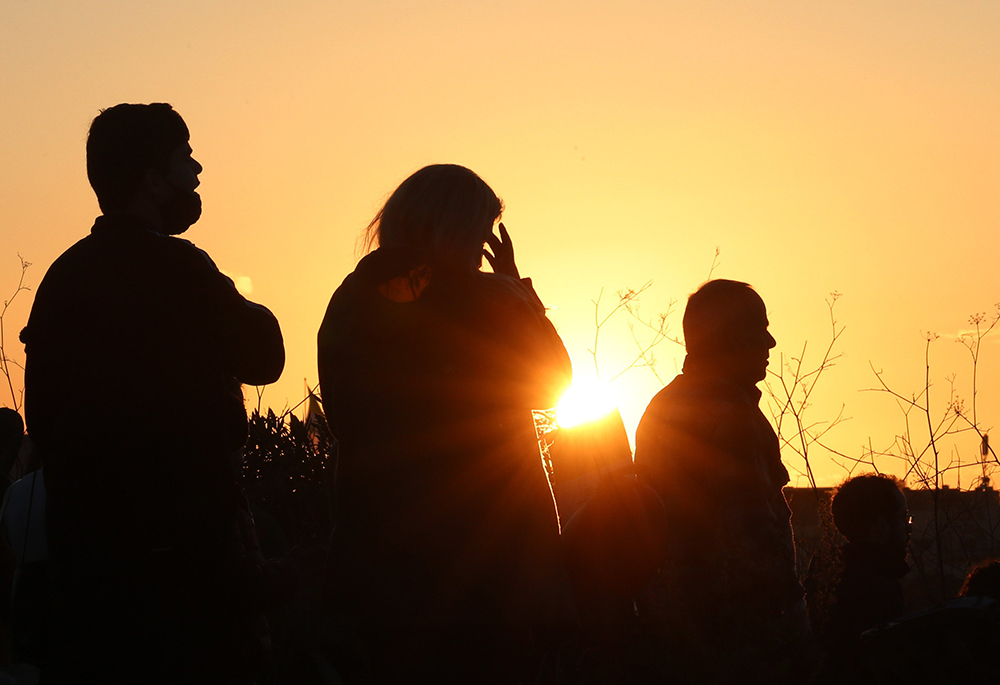
People make the sign of the cross as they receive Pope Francis' blessing during a prayer meeting at Ta' Pinu National Shrine in Gozo, Malta, April 2, 2022. (CNS/Paul Haring)
"In the name of the Father and of the Son and of the Holy Spirit." How often do you blithely say that? Have you ever considered how audacious that is? In the Eucharistic liturgy we say, "We dare to say, Our Father …" But outside of the Mass we begin prayer by claiming to speak in the name of the Trinity, and we rarely think twice about it.
In what ways might we be like the Pharisee of the story Jesus tells us today? Was that fellow reflecting on what he was saying or was he just reciting a litany that he considered a prayer of thanksgiving? How often do prayers roll off our tongue while we're thinking of something else entirely?
When we listen to a cranky child, a dissatisfied student, an upset client or even someone who is telling us the same story for the umpteenth time, we might wish they were filling a hot air balloon instead of delivering their suffocating monologue to us. Could that be how God feels when we pray, not without ceasing, but without thinking or feeling?
Jesus designed the story of the Pharisee and tax collector to catch us short, to make us reconsider our practice and theology of prayer, but we may have heard it too often to give it the attention it deserves.
When I think of that tax collector, I think of an experience at a parish where I recently made a mission appeal. I can't count how many young people I saw with tattoos, baseball caps, leather jackets and mildly intimidating appearances go into church with reverence. Guys were accompanied by girls in tight jeans and long black mantillas. There they knelt with heads bowed, praying for all they were worth. They did not look like the people I expected to find outdoing the Legion of Mary!
Some of these young people attend very "conservative" parishes. There, they and many others seem to experience a depth that they don't find in much of our culture. Incense takes them away from the world of street and screen. Kneeling and singing in Latin helps them reach out to something older, greater and more mysterious than what they find in their everyday surroundings. They're not tax collectors, but many people on the subway or walking down a poorly lit street might be nervous at seeing them approach. These young people are incognito God-seekers whose reverence and piety offer a witness to any who are willing to see.
There's a scene in Luke 11 in which the disciples asked Jesus to teach them to pray. That's the most teaching about prayer in the Gospel of Luke. Today's story draws us beyond the prayers we've learned and even our own styles of prayer. The last thing the Pharisees and Jesus' disciples wanted to hear was about the holiness of a tax collector — and that's precisely why Jesus told his story.
Advertisement
The Preface to Eucharistic Prayer IV says, "You have no need of our praise, yet our desire to thank you is itself your gift." That implies that the urge to pray, the desire to be intimate with God, is itself God-given. We were created with this desire, and God urges us to engage in relationship.
Neither the tax collector nor the Pharisee made the sign of the cross; that wouldn't come in for another 200 years or so. But one of them prayed with all the humility of someone who feels invited into the presence of a loving God while the other offered his résumé and a vague thanks for being better than most.
What do we mean when we start to pray with the Sign of the Cross? If we believe that the desire to pray is God-given, then beginning our prayer with this gesture declares that we are accepting the divine invitation to express and deepen our relationship. When we do it together, we proclaim that this community has been called together by God and relates to God together. That's quite an act of faith in God and in our companions!
Today's Gospel story reminds us that prayer calls forth genuine encounter; or, we might say, "real presence." To pray at the invitation of the Trinity requires us to strive to be as fully and genuinely present as we can be, to God and to those with whom we pray. Whether we bow or cover our heads, whether incense and bells or guitars and chimes help us enter more consciously into God's presence, we remember that we pray at God's unceasing invitation.
We can pray in petition, praise, thanksgiving or repentance, but underneath every kind or style of prayer, the purpose is simply to grow in relationship with God and the people of God — which means everyone.
